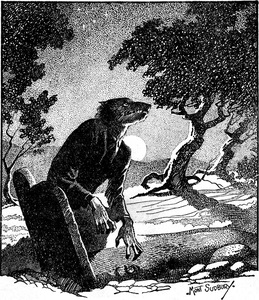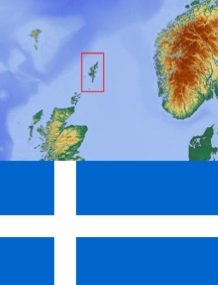Wulver: Shetland's kind and generous werewolf

Shetland, also known as the Shetland Islands lie some 104 miles (168 km) northeast of Scotland. They form part of the division between the Atlantic Ocean to the west and the North Sea to the east. Humans have lived in Shetland since the Mesolithic period and there are over 5,000 archaeological sites all told. One such at West Voe on the south coast of Mainland, which is the largest island, has been dated to 4320–4030 BC. During a period of Viking expansion, Shetland was eventually colonised by the Norse during the late 8th and 9th centuries. Norwegian king Harald Hårfagre annexed the Northern Isles (comprising Orkney and Shetland) in 875. Shetland remained under Norwegian influences until Shetland become part of Scotland in the 15th century.

Shetland is rich in mythology, folklore and legend. One of a number of otherworldly creatures that are said to inhabit the lands and surrounding seas of Shetland is the Wulver. The Wulver has some similarities to a werewolf in that it is part human and part wolf in appearance. However, unlike most werewolves the Wulver is not a shapeshifter. It has never been a human being and does not turn into a wolf-like creature at times of a full moon. The Wulver has a body like a man, covered in short brown hair, with a wolf's head. This is his permanent state of being. There is also another marked difference between the traditional view of a werewolf and that of a Wulver. Whereas a werewolf is a creature to be feared with malign intent. The Wulver is completely opposite and is noted for having a kind heart.
As long as people leave him to live his life in peace he will not pose any risk to a human. He is happy to live alone in a cave on Shetland and enjoy the peaceful life. When seen he is fishing from a rock known as ‘The Wulver’s Stane’. If he does intervene in the lives of people it is to perform a generous and kindly act. The Wulver is known to have helped lost travellers, by guiding them to nearby towns and villages. He is reported to have left fish on the windowsills of poor families. If the Wulver learnt that a family was facing hardship and was without food, his benevolent nature would come to the fore and he would provide them with a supply of fish. It is also said that if a family was faced with sickness and death, the Wulver could be seen paying his respects outside their home.

So when visiting Shetland remove the idea of the malign and dangerous werewolf so often seen in horror films. Because the half-wolf and half-man creature that you might meet there is filled with kindness and generosity. If lost he might help you find your way and if hungry he might share his food. Respect shown to the benevolent Wulver of Shetland is always returned in equal measure.
Content type:
- Scottish
Language:
- English





